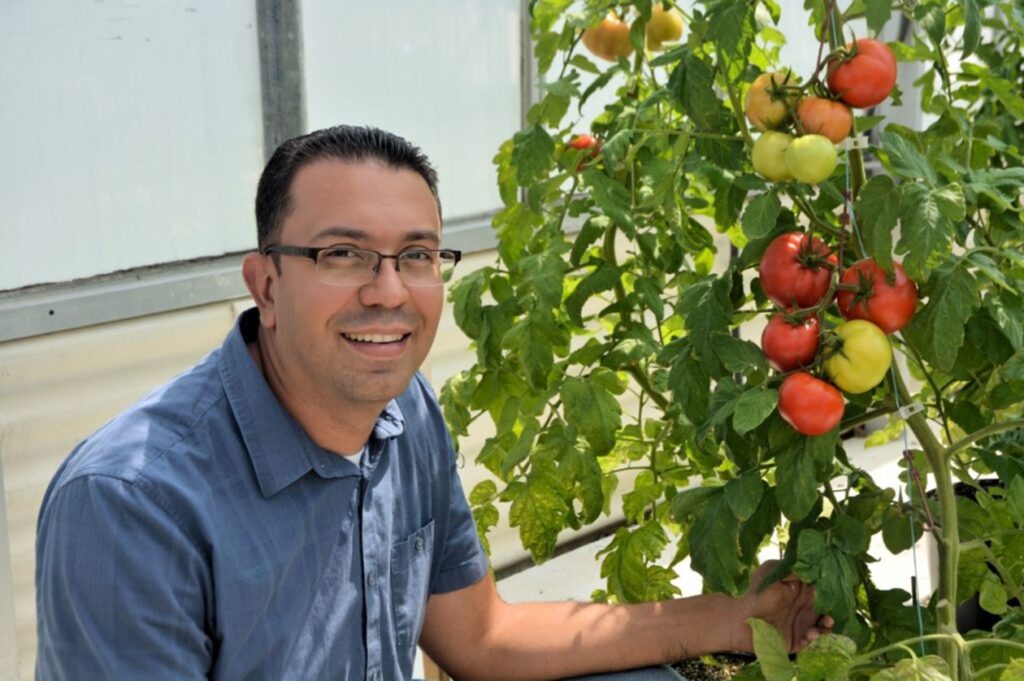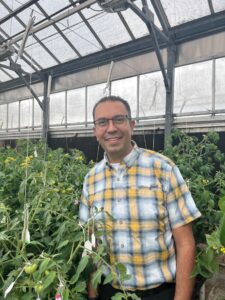In search of the ‘holy grail’ of tomatoes
Texas A&M AgriLife researchers target tomato firmness, shelf life, nutritional value
The U.S. Department of Agriculture has funded a new Texas A&M AgriLife Research project expected to bring researchers even closer to developing the “holy grail” of tomatoes.
The project is part of an ongoing $16.2 million U.S. Department of Agriculture National Institute of Food and Agriculture investment in innovative plant breeding research. It aims to characterize an exceptional novel tomato firmness trait found in the Texas A&M breeding line TAM-Sp18-157, developed by the breeding program at the Texas A&M AgriLife Research and Extension Center at Weslaco.

Project research will be led by Carlos Avila, Ph.D., AgriLife Research associate professor in vegetable breeding at the Weslaco center. Avila is affiliated with the Department of Horticultural Sciences in the Texas A&M College of Agriculture and Life Sciences, Bryan-College Station.
Avila will work with Kranthi Mandadi, Ph.D., AgriLife Research associate professor in Weslaco and with the Department of Plant Pathology and Microbiology; and Bhimu Patil, Regent Professor, director of the Vegetable and Fruit Improvement Center, Department of Horticultural Sciences, and the USDA National Center of Excellence, Bryan-College Station.
“This new project is part of breeding efforts to dissect the genetics and effects on human health attributes, flavor and aroma relating to the firmness trait of a Texas A&M line that provides long shelf life for the tomato,” said Avila, who will serve as project director. “With this, we hope to be one step closer to developing the holy grail of tomatoes to meet the long-standing demand of agricultural producers and consumers.”
Dirk Hays, Ph.D., Texas A&M AgriLife center director at Weslaco, said the development of flavorful and nutritious tomatoes with a long shelf life, good appearance and high yield would lead to increased tomato consumption and contribute to healthier lives for consumers and improved livelihoods for producers.
Stakeholders identify research needs
The research team said the new project’s long-term goal and objectives were formulated from surveyed stakeholder needs deemed critical to the sustainability of the tomato industry.
“These needs included as a priority the development of high-quality fruits to meet consumer demands,” Patil said. “The survey results from growers, consumers, retailers and marketers demonstrated the need to improve shelf life, quality, texture, color, aroma and taste in fresh and processed tomatoes for increased consumer satisfaction and optimized market value.”
Previous tomato improvement attempts with the genes that delay softening have had the unfortunate effect of negatively affecting fruit color, flavor and human health attributes, Avila said.
“As a result, there is a general concern that most modern tomato cultivars have lost their flavor,” Avila said. “This affects both consumption and supermarket sales.”
Building on previous research success
The new project continues the 2019 project “Novel Tomato Fruit Firmness Trait: Breeding for Long Shelf Life While Conserving Flavor Is Now Possible.”
“In the previous project, we evaluated and characterized fruit firmness for trait stability in three locations — Weslaco, Uvalde and Bryan-College Station,” said Avila, who also led the previous project. “We developed F1 hybrids, evaluated their shelf life at different storage conditions and developed F2 mapping populations. Our successful accomplishment of these objectives and the very promising data we obtained directed us toward additional lines of investigation.”
Avila said the firmness trait in the newly developed TAM-Sp18-157 line is different in that it produces extraordinarily firm tomatoes while conserving their flavor and color.
“It does this because the ripening process is not inhibited,” Avila said. “When used as a parental line, the resulting F1 hybrids have shown improved firmness, enhanced sugar and acid content, and higher amounts of dry matter and fruit yield.”
He said the new Texas A&M AgriLife tomato line produces a firm tomato that does not “leak” when sliced or diced and has a uniformly red color – traits highly desired by both the industry and consumers.
Additionally, field trials at the Texas A&M AgriLife center in Weslaco have shown TAM-Sp18-157 has an excellent combining ability when used as a parent for hybrid cultivar development.
“The fruit firmness in the TAM-SP18-157 breeding line is superior to what was expected,” Avila said. “The compression peak for this tomato indicates a fruit 70% firmer compared to the average firmness in the Texas A&M AgriLife tomato breeding population.”
He said the additional firmness provides a longer shelf life, even when the tomato is harvested when completely ripe.
“This allows the tomatoes to fully develop their flavor and nutritional content while staying fresh longer,” he said.
Objective of the new research
In their research, the researchers have determined their new line lacks the locule gel phenotype generally found in tomatoes. They will work to identify the mechanism behind the development of locule gel and what role it plays, as well as map quantitative firmness traits, QTLs, and investigate factors affecting tomato human health attributes, flavor, aroma and shelf life.
Since the role of locule gel in tomato development and post-harvest shelf life is not completely known, the lack of locule gel in the Texas A&M AgriLife breeding line offers a great opportunity to understand its effects on fruit quality.
Avila and Mandadi will investigate the gene responsible for the lack of locule gel phenotype and map pericarp firmness QTLs.
“We have found that fruit firmness traits are the result of a lack of locule gel and novel firmness alleles in the part of a fruit formed from the wall of the ripened ovary in TAM-Sp18-157,” Mandadi said. “We plan to investigate the mechanism behind this lack of locule gel and identify and map those markers that affect firmness.”
Avila and Patil will collaborate to determine the effect of locule gel and fruit pericarp firmness on tomato human health attributes, flavor and aroma.
“We expect that high dry matter content in TAM-Sp18-157 results in improved nutritional content that can be maintained during produce shelf life,” Patil said. “Now we will look into profiling these human health-promoting compounds to help develop a tomato that is both nutritious and flavorful.”
Avila and Mandadi will also investigate the effect of locule gel and pericarp fruit firmness traits on tomato ripening and shelf life.
“Our goal is to determine how the firmness trait in TAM-Sp18-157 modifies the ripening process, resulting in extended shelf life,” Mandadi said. “We plan to do this through a comprehensive gene expression analysis that can be applied toward further cultivar development.”



